
Greta Garbo was a Swedish-American actress and a premiere star during Hollywood's silent and early golden eras. Regarded as one of the greatest screen actresses of all time, she was known for her melancholic, somber persona, her film portrayals of tragic characters, and her subtle and understated performances. In 1999, the American Film Institute ranked Garbo fifth on its list of the greatest female stars of classic Hollywood cinema.

Herbert Brough Falcon Marshall was an English stage, screen, and radio actor who starred in many popular and well-regarded Hollywood films in the 1930s and 1940s. After a successful theatrical career in the United Kingdom and North America, he became an in-demand Hollywood leading man, frequently appearing in romantic melodramas and occasional comedies. In his later years, he turned to character acting.

Salka Viertel was an Austrian actress and Hollywood screenwriter. While under contract with Metro-Goldwyn-Mayer from 1933 to 1937, Viertel co-wrote the scripts for many movies, particularly those starring her close friend Greta Garbo, including Queen Christina (1933) and Anna Karenina (1935). She also played opposite Garbo in MGM's German-language version of Anna Christie in 1930.

Queen Christina is a pre-Code Hollywood biographical film, produced for Metro-Goldwyn-Mayer in 1933 by Walter Wanger and directed by Rouben Mamoulian. It stars Swedish-born actress Greta Garbo and John Gilbert in their fourth and last film together.
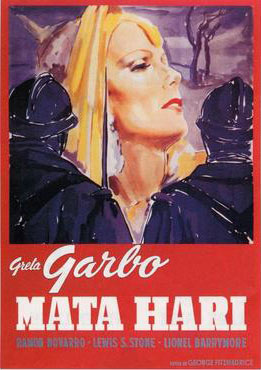
Mata Hari is a 1931 American pre-Code drama film directed by George Fitzmaurice loosely based on the life of Mata Hari, an exotic dancer and courtesan executed for espionage during World War I. The Metro-Goldwyn-Mayer film stars Greta Garbo in the title role. It was Garbo's most commercially successful vehicle. Only a censored version of the film is currently available.

The Painted Veil is a 2006 American drama film directed by John Curran. The screenplay by Ron Nyswaner is based on the 1925 novel of the same title by W. Somerset Maugham. Edward Norton, Naomi Watts, Toby Jones, Anthony Wong Chau Sang and Liev Schreiber appear in the leading roles.
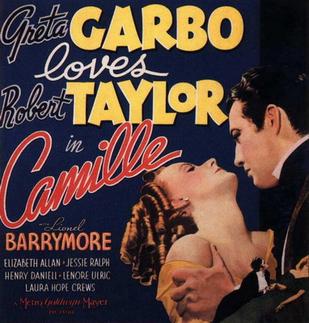
Camille is a 1936 American romantic drama film from Metro-Goldwyn-Mayer directed by George Cukor, and produced by Irving Thalberg and Bernard H. Hyman, from a screenplay by James Hilton, Zoë Akins, and Frances Marion. The picture is based on the 1848 novel and 1852 play La dame aux camélias by Alexandre Dumas, fils. The film stars Greta Garbo, Robert Taylor, Lionel Barrymore, Elizabeth Allan, Jessie Ralph, Henry Daniell, and Laura Hope Crews. It grossed $2,842,000.

The Painted Veil is a 1925 novel by British author W. Somerset Maugham. The title is a reference to Percy Bysshe Shelley's 1824 sonnet, which begins "Lift not the painted veil which those who live / Call Life".

Anna Christie is a 1930 German-language film adapted from the 1921 Eugene O'Neill play of the same title and filmed following the release of the English-language original version of the same adaptation earlier the same year. Both versions feature leading actress Greta Garbo. In the early years of sound films, Hollywood studios produced foreign-language versions of some of their films using the same sets and sometimes the same costumes, with native speakers of the language usually replacing some or all of the original cast. The German-language version of Anna Christie is one of the few that survives.

The Seventh Sin is a 1957 American drama film directed by Ronald Neame and starring Eleanor Parker, Bill Travers and George Sanders. It is based on the 1925 novel The Painted Veil by W. Somerset Maugham.
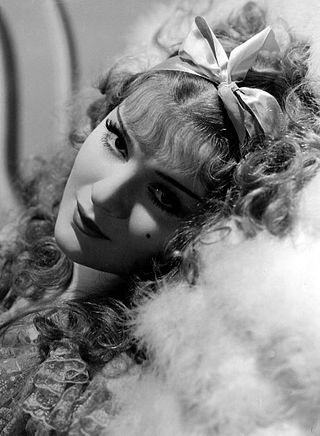
Anna Sten was a Ukrainian-born American actress. She began her career in stage plays and films in the Soviet Union, then traveled to Germany, where she starred in several films. Her performances were noticed by film producer Samuel Goldwyn, who brought her to the United States with the aim of creating a screen personality to rival Greta Garbo. After a few unsuccessful films, Goldwyn released her from her contract. She continued to act occasionally until her final film appearance in 1962.

Love is a 1927 American silent drama film directed by Edmund Goulding and released by Metro-Goldwyn-Mayer. A sound version of the film was released in 1928 with a synchronized musical score with sound effects. MGM made the film to capitalize on its winning romantic team of Greta Garbo and John Gilbert who had starred in the 1926 blockbuster Flesh and the Devil.
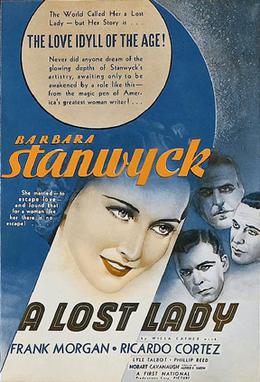
A Lost Lady is a 1934 American drama film directed by Alfred E. Green and starring Barbara Stanwyck, Frank Morgan, and Ricardo Cortez. Based on the 1923 novel A Lost Lady by Willa Cather, with a screenplay by Gene Markey and Kathryn Scola, the film is about a woman whose fiancé is murdered by his mistress' husband two days before their wedding. Her uncle sends her away to the mountains, where she meets a man who looks after her and eventually proposes. She accepts even though she does not love him.
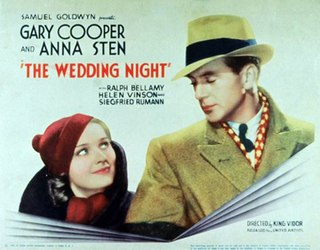
The Wedding Night is a 1935 American romantic drama film directed by King Vidor and starring Gary Cooper and Anna Sten. Written by Edith Fitzgerald and based on a story by Edwin H. Knopf, the film is about a financially strapped novelist who returns to his country home in Connecticut looking for inspiration for his next novel and becomes involved with a beautiful young Polish woman and her family. The film was produced by Samuel Goldwyn and filmed at Samuel Goldwyn Studios from early November to early December 1934. It was released in the United States on March 8, 1935.

Little Big Shot is a 1935 American film directed by Michael Curtiz, and starring Sybil Jason and Glenda Farrell. The film was released by Warner Bros. on September 7, 1935. The plot concerns a young girl who endears herself to her caretakers after her father is murdered by mobsters.
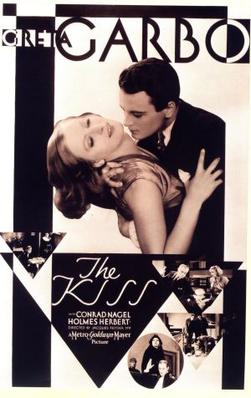
The Kiss is a 1929 American synchronized sound drama film directed by Jacques Feyder, starring Greta Garbo, Conrad Nagel, and Lew Ayres in his first feature film. The film has no audible dialogue but featured a synchronized musical score and sound effects. The soundtrack was recorded using the Western Electric Sound System sound-on-film process. The soundtrack was also transferred to discs for those theatres that were wired with sound-on-disc sound systems.

A Woman of Affairs is a 1928 Metro-Goldwyn-Mayer synchronized sound drama film directed by Clarence Brown and starring Greta Garbo, John Gilbert, Douglas Fairbanks Jr. and Lewis Stone. While the film has no audible dialog, it was released with a synchronized musical score with sound effects using both the sound-on-disc and sound-on-film process. The film was based on a 1924 best-selling novel by Michael Arlen, The Green Hat, which he adapted as a four-act stage play in 1925. The Green Hat was considered so daring in the United States that the movie did not allow any associations with it and was renamed A Woman of Affairs, with the characters also renamed to mollify the censors. In particular, the film script eliminated all references to heroin use, homosexuality and syphilis that were at the core of the tragedies involved.
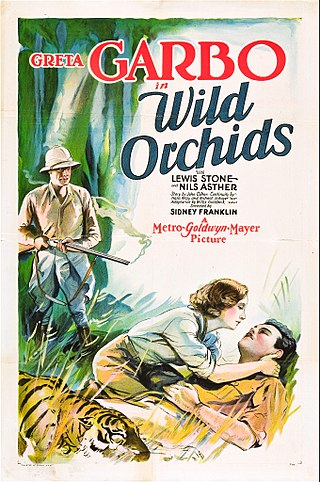
Wild Orchids is a 1929 American synchronized sound drama film from Metro-Goldwyn-Mayer directed by Sidney Franklin and starring Greta Garbo, Lewis Stone and Nils Asther. Only these three stars received cast credit. While the film has no audible dialog, it was released with a synchronized musical score with sound effects using both the sound-on-disc and sound-on-film process. The plot is very similar to Garbo's later sound film, The Painted Veil (1934).

Bodil Rosing was a Danish stage and American film actress in the silent and sound eras.

The Right to Live is a 1935 American drama film directed by William Keighley and starring Josephine Hutchinson, George Brent and Colin Clive. The film was shot at Warner Brothers's Burbank Studios, with sets designed by the art director Esdras Hartley.




















